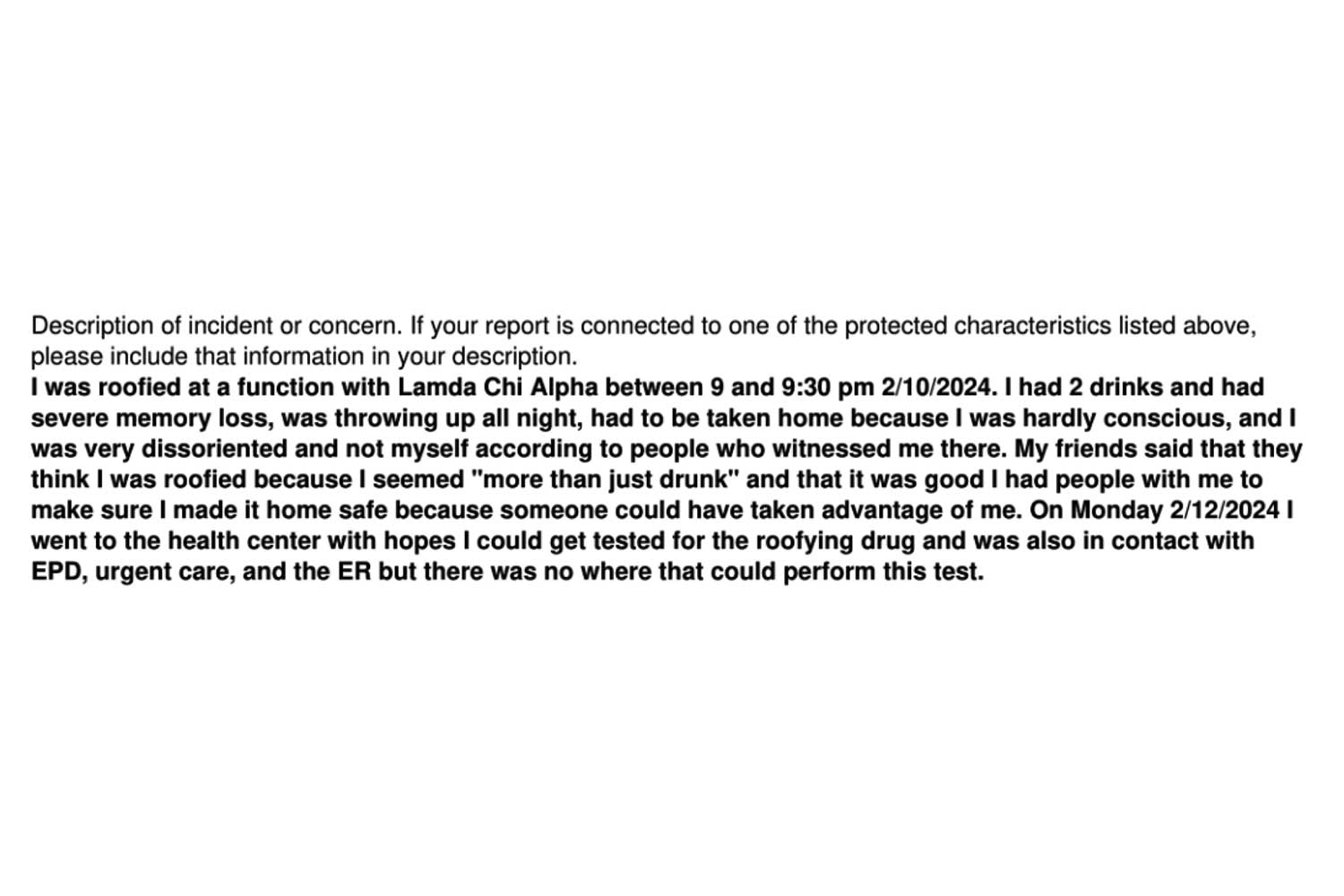The University of Oregon concealed reports of druggings at two fraternity parties in early 2024, even as UO officials faced criticism for failing to issue timely warnings to students that several women had been drugged while attending Greek events.
In March, UO officials disclosed that nine students reported they had been drugged during six fraternity parties in January and February. UO officials acknowledged the reports only after a student-run news website broke the story and two of the victims went public with their allegations.
In response to an inquiry by Eugene Weekly, UO spokesperson Angela Seydel wrote in a March 3 email that the university had “received six reports involving nine students indicating they may have unknowingly ingested some substance that caused some level of incapacitation or need for medical care.”
UO also provided EW with documents that described the six incidents and identified three fraternities involved: Theta Chi, Delta Sigma Phi and Phi Delta Theta.
But records obtained in July by EW under Oregon public records law show UO officials knew of two additional reports of druggings that the previous documents did not disclose. The incidents took place at parties sponsored by Phi Kappa Psi and Lambda Chi Alpha fraternities. There are no public records that indicate either fraternity faced any consequences.
Seydel and other UO officials did not respond to questions about the failure to disclose the additional drugging cases.
The druggings, commonly referred to as “getting roofied,” often target women who are unknowingly given drinks with “date rape” drugs, including sedatives such as Rohypnol or scopolamine. None of the women in the early 2024 cases reported being assaulted after the druggings.
In April, EW reported that UO officials had failed to follow federal law that encourages universities to issue “timely warnings” to students when they learn about aggravated assaults on campus or within the jurisdiction of university police. UO’s own 2023 policy declared that giving someone a controlled substance without their knowledge is “poisoning” and constitutes aggravated assault.
But UO officials never issued a warning after any of the reported drugging cases at fraternity parties in early 2024, and none of the cases showed up in the crime logs last winter.
EW also reported that UO officials made a series of false and misleading statements about why they failed to warn students about the drugging allegations.
The documents obtained by EW raise new questions about the UO’s candor and transparency under President John Karl Scholz, who is now in his second year leading the university. Scholz did not respond to a request for an interview.
Doug Fierberg, founder of Fierberg National Law Group, which represents survivors of school violence, says the discovery of the two additional druggings underscores UO officials’ failure to warn students.
“For the university to continue concealing serious risks from students reflects a shocking disregard for their health and safety,” he says. “The university has significant control over fraternities, their members and dangerous misconduct by both, enough so that it can and should eliminate these risks immediately and warn students.”
Zoey Brewer, policy and grassroots coordinator for RAINN, a national anti-sexual violence advocacy group, says the UO’s withholding of information denied students the opportunity to make informed decisions.
“It’s outrageous for the university to have not even done the bare minimum required when the dangerousness of the circumstances demand more than what the baseline of law might require,” Brewer says. “If you have a clear set of risks to your student population, particularly women, you have an obligation to identify those risks as clearly and as immediately as possible, so they can take actions to protect themselves.”
Wendy Murphy, a lawyer who specializes in interpersonal violence and successfully sued Princeton University and Harvard Law School for Title IX Violations, says parents should be concerned for their children’s safety.
“It should be terrifying to every parent, especially of a freshman woman who’s headed off to college,” Murphy says. “Schools do nothing to prevent the drugging of female students on college campuses.”
The Clery Act is a federal law that requires colleges and universities to track and report campus crime statistics and establish clear policies on campus safety. The Jeanne Clery Disclosure of Campus Security Policy and Crime Statistics Act was passed in Congress in 1990 and was named for a Lehigh University freshman who was raped and murdered in her dorm room.
At a minimum, UO officials are obligated to report crimes that fall under the Clery Act, including criminal homicide, sexual assault, robbery, aggravated assault and burglary. The 2023 UO Annual Security Report labeled druggings as “poisoning” and says it treats them as aggravated assault, whether or not the druggings result in or involve sexual assault.
According to records released by UO, the first alleged drugging took place Jan. 10 at the Delta Sigma Phi Chapter House, 1851 Onyx Street. “She reported that she believes she was roofied at the Delta Sigma Phi Chapter on 1/10/24,” the report reads. “She stated that she did not get drug tested but knows that she was drugged due to how she felt the next day and her lack of memory.”
The woman didn’t report the incident for two weeks. By that time, UO officials received reports of three additional druggings, including two at parties hosted by Delta Sigma Phi and one by Theta Chi. Another case involving Theta Chi arrived days later.
Records obtained by EW show that by Feb. 2, more than 20 UO officials had been informed of at least one of the drugging allegations. But UO officials chose not to alert students or the public.
The two allegations that UO officials failed to disclose took place amid these other reports of roofies at fraternity parties.
A student reported she had been drugged while at the house. “At a party at the Phi Psi chapter house, I was roofied by a member of Pike. The party was on January 13 and Phi Psi was hosting Pike. It happened around midnight.”
The student filed the report on Feb 4. It’s not clear if UO investigated the allegation. There’s no evidence that UOPD was told about the alleged drugging, and the UO police log included no entry for the incident.
EW asked UO officials to explain how the university’s protocol to comply with the Clery Act routes communication so that campus police are made aware of reported Clery crimes. The UO Clery website says “Crimes should be reported as soon as possible (within minutes, not hours, days or weeks) so that law enforcement can better apprehend the perpetrator and also notify the campus community about any serious or ongoing threat to health or safety.”
The university declined to explain the route of communication that ensures UOPD is made aware of Clery crimes to determine if a timely warning is warranted.

The second case UO officials failed to disclose involved a Feb. 10 party at a Lambda Chi Alpha “liveout” at 988 Ferry Lane. (A liveout is rental housing only for fraternity members.)
Two weeks later, a student reported having been drugged at the party that night:
“I was roofied at a function with Lambda Chi Alpha between 9 and 9:30 pm 2/10/2024. I had 2 drinks and had severe memory loss, was throwing up all night, had to be taken home because I was hardly conscious, and I was very disoriented and not myself according to people who witnessed me there. My friends said that they think I was roofied because I seemed ‘more than just drunk’ and that it was good I had people with me to make sure I made it home safe because someone could have taken advantage of me.”
The woman said she spoke to EPD and went to an emergency room to get tested for the presence of a date rape drug in her system. “But there was nowhere that could perform this test,” she said.
Even though druggings are considered a crime, UO officials labeled the allegation “Other Unwelcome Conduct.”
Records show the report was sent to Dianne Tanjuaquio, associate dean of Students and Director of Student Conduct and Community Standards; Deborah Berman, data analyst and case coordinator for the Office of Investigations and Civil Rights Compliance; and Vanessa Crakes, manager of investigations for the Office of Investigations and Civil Rights Compliance.
The sanctions faced by the other fraternities — Theta Chi, Delta Sigma Phi and Phi Delta Theta — were short-lived. According to UO officials, interim suspension means that the organization is prohibited from engaging in all organization activities, such as intramural sports. The suspension also means the fraternity is “denied access to all University activities and privileges for which the organization might otherwise be eligible,” such as recruitment or hosting special events.
However, none of those consequences seemed to have real teeth.
Emails obtained by EW show that, only five days after issuing Phi Delta Theta interim suspension, Tanjuaquio granted exceptions to the suspension, allowing the fraternity to hold weekly chapter meetings and host Dad’s Weekend.
Tanjuaquio waited four days after issuing Delta Sigma Phi’s suspension to allow the fraternity exceptions, including executive board and chapter meetings.
Tanjuaquio only waited three days after suspending Theta Chi to allow that fraternity even broader exceptions, including allowing participation in intramural sports, hosting philanthropy social events, holding Chapter meetings and hosting Dad’s Weekend.
“When you have a school that isn’t going to prioritize accountability and isn’t going to prioritize transparency, fraternities can pose such a serious health risk and safety risk to their student population,” Brewer says. “Students don’t feel like they can trust their administration, and they certainly don’t feel like they can have any sense of safety on campus.”
With classes starting earlier this week, there are no records to be found on the university’s website that inform students and parents of last year’s criminal events. Additionally, the interim suspensions put on three fraternities for drugging reports have been lifted.
“Parents and students should be pounding on the front doors of the university to tell them the truth about Greek life, the organizations that have been roofieing students and to demand full exposure of information so the women coming to campus can protect themselves,” Fierberg says. “And I mean pounding on the front doors.”
